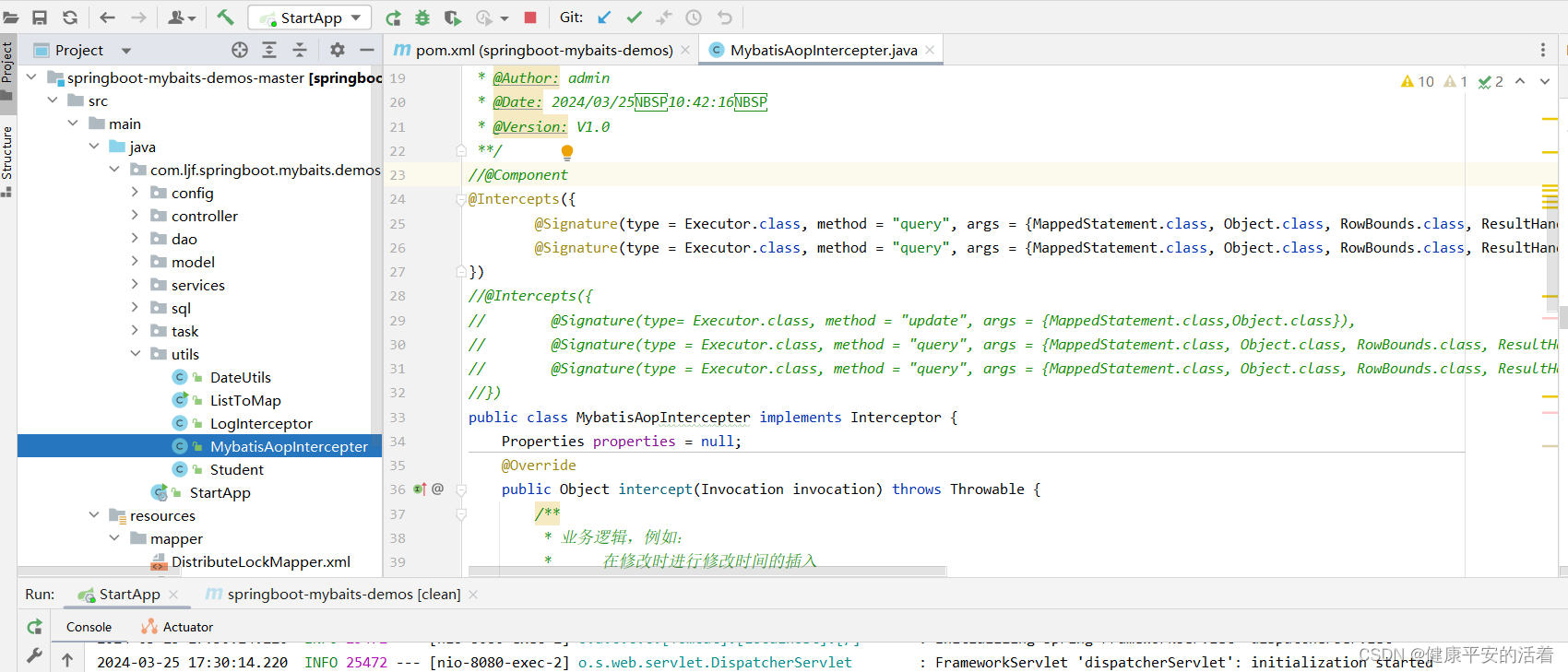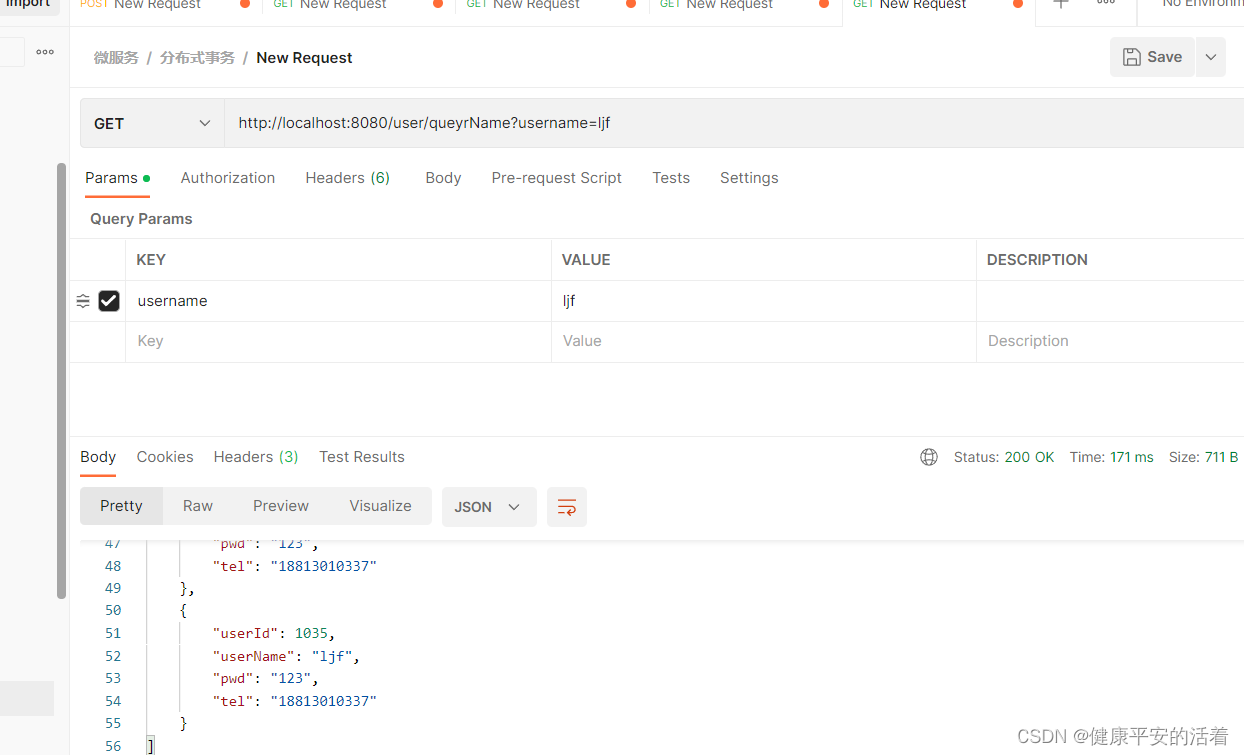- Golang函数和包
- 关于MYSQL的XA事务(分布式事务)的了解以及MySQL5.7.7对
- 基于知识图谱的大学生就业能力评价和职位推荐系统——超详细要点总结(创作
- 详细分析Mysql中的LOCATE函数(附Demo)
- MySQL默认值(DEFAULT)和MySQL非空约束(NOT NUL
- SpringBoot 2.2.5 配置Logback打印日志,并自定义
- 监听Redis中Key值的变化(SpringBoot整合)
- 【Golang入门教程】Go语言变量的声明
- MySQL实验三 数据查询二
- 数据结构——循环队列详解
- 【新知实验室 - TRTC 实践】音视频互动 Demo、即时通信 IM
- Rust入门:C++和Rust动态库(dll)的相互调用
- Java体育馆场地预约系统设计与实现(Idea+Springboot+
- 如何利用SpringSecurity进行认证与授权
- 基于Django的婚纱摄影预约系统设计与实现(Pycharm+Pyth
- Python贵州贵阳二手房源爬虫数据可视化分析大屏全屏系统
- ThinkPHP 系列漏洞
- 鸿运应用开发学习-发现了一个TextInput组件中使用正则表达式后出
- Python某城市酒店爬虫数据可视化分析和推荐查询系统
- Java项目:基于Springboot框架实现的校园求职招聘系统(sp
- 2-1.Hadoop大数据集群搭建之---本地模式
- 实战演练 | 使用 Navicat 进行 MySQL 数据同步
- [架构之路-214]- UML-类图图解、详解、结构化、本质化讲解
- springboot 如何编写增删改查后端接口,小白极速入门,附完整代
- 解决,“该设备或资源(Web 代理)未设置为接受端口“7890”上的连
- 华为ensp中nat server 公网访问内网服务器
- 【热门话题】Node.js 常用命令详解:资深前端开发者视角
- tomcat默认最大线程数、等待队列长度、连接超时时间
- 揭秘智慧礼品背后的故事
- java.sql.SQLNonTransientConnectionE
一 mybatis的拦截器
1.1 拦截器介绍
拦截器是一种基于 AOP(面向切面编程)的技术,它可以在目标对象的方法执行前后插入自定义的逻辑。
1.2 语法介绍
1.注解@Intercepts
@Intercepts({@Signature(type = StatementHandler.class, method = “prepare”, args = {Connection.class, Integer.class})}),表示在 SQL 执行之前进行拦截处理。
@Intercepts 的作用:声明这是一个拦截器。
属性:Signature(注解)
@Signature:要拦截的具体方法
属性: type-拦截接口(四种类型 ),
method-拦截的方法(update,insert,select),
args-重载时根据参数列表确定要拦截的方法。
2.介绍:
Executor:拦截执行器的方法,例如 update、query、commit、rollback 等。可以用来实现缓存、事务、分页等功能。
ParameterHandler:拦截参数处理器的方法,例如 setParameters 等。可以用来转换或加密参数等功能。
ResultSetHandler:拦截结果集处理器的方法,例如 handleResultSets、handleOutputParameters 等。可以用来转换或过滤结果集等功能。
StatementHandler:拦截语句处理器的方法,例如 prepare、parameterize、batch、update、query 等。可以用来修改 SQL 语句、添加参数、记录日志等功能。
1.3 API接口
1.intercept:主要是写我们具体业务逻辑,比如针对增删改sql语句添加更新日期。
2.plugin:生成代理对象
3.setProperties:设置拦截器属性

二 实现案例
2.1 结构

2.2 代码
package com.ljf.springboot.mybaits.demos.utils;
import org.apache.ibatis.executor.Executor;
import org.apache.ibatis.mapping.BoundSql;
import org.apache.ibatis.mapping.MappedStatement;
import org.apache.ibatis.mapping.ParameterMapping;
import org.apache.ibatis.plugin.*;
import org.apache.ibatis.reflection.MetaObject;
import org.apache.ibatis.session.Configuration;
import org.apache.ibatis.session.ResultHandler;
import org.apache.ibatis.session.RowBounds;
import org.apache.ibatis.type.TypeHandlerRegistry;
import org.springframework.stereotype.Component;
import java.text.DateFormat;
import java.util.Date;
import java.util.List;
import java.util.Locale;
import java.util.Properties;
/**
* 1. 打印mysql完整的执行语句
* 2. 打印mysql语句执行时间
* 这里我们拦截Executor里面的query和update方法
*/
@Component
@Intercepts({
@Signature(
method = "query",
type = Executor.class,
args = {MappedStatement.class, Object.class, RowBounds.class, ResultHandler.class}
),
@Signature(
type = Executor.class,
method = "update",
args = {MappedStatement.class, Object.class}
)
})
public class LogInterceptor implements Interceptor {
/**
* 是否显示语句的执行时间
*/
public static final String PROPERTIES_KEY_ENABLE_EXECUTOR_TIME = "enableExecutorTIme";
public static final String ENABLE_EXECUTOR_TIME = "0"; // 显示
private boolean enableExecutorTime = false;
@Override
public Object intercept(Invocation invocation) throws Throwable {
System.out.println("dddddd======");
// 获取执行方法的MappedStatement参数,不管是Executor的query方法还是update方法,第一个参数都是MappedStatement
MappedStatement mappedStatement = (MappedStatement) invocation.getArgs()[0];
Object parameter = null;
if (invocation.getArgs().length > 1) {
parameter = invocation.getArgs()[1];
}
String sqlId = mappedStatement.getId();
BoundSql boundSql = mappedStatement.getBoundSql(parameter);
Configuration configuration = mappedStatement.getConfiguration();
long sqlStartTime = System.currentTimeMillis();
Object re = invocation.proceed();
long sqlEndTime = System.currentTimeMillis();
// 打印mysql执行语句
String sql = getSql(configuration, boundSql, sqlId);
System.out.println(sql);
// 打印mysql执行时间
if (enableExecutorTime) {
String sqlTimeLog = sqlId + " 方法对应sql执行时间:" + (sqlEndTime - sqlStartTime) + " ms";
System.out.println(sqlTimeLog);
}
return re;
}
/**
* 通过该方法决定要返回的对象是目标对象还是对应的代理
* 不要想的太复杂,一般就两种情况:
*
* 1. return target; 直接返回目标对象,相当于当前Interceptor没起作用,不会调用上面的intercept()方法
* 2. return Plugin.wrap(target, this); 返回代理对象,会调用上面的intercept()方法
*
* @param target 目标对象
* @return 目标对象或者代理对象
*/
@Override
public Object plugin(Object target) {
System.out.println("==================dssssssssss");
return Plugin.wrap(target, this);
}
/**
* 用于获取在Configuration初始化当前的Interceptor时时候设置的一些参数
*
* @param properties Properties参数
*/
@Override
public void setProperties(Properties properties) {
if (properties != null) {
String executorTImeValue = properties.getProperty(PROPERTIES_KEY_ENABLE_EXECUTOR_TIME);
if (executorTImeValue != null) {
enableExecutorTime = executorTImeValue.equals(ENABLE_EXECUTOR_TIME);
}
}
}
private static String getSql(Configuration configuration, BoundSql boundSql, String sqlId) {
return sqlId + " 方法对应sql执行语句:" + assembleSql(configuration, boundSql);
}
/**
* 转义正则特殊字符 ($()*+.[]?\^{}
* \\需要第一个替换,否则replace方法替换时会有逻辑bug
*/
private static String makeQueryStringAllRegExp(String str) {
if (str != null && !str.equals("")) {
return str.replace("\\", "\\\\").replace("*", "\\*")
.replace("+", "\\+").replace("|", "\\|")
.replace("{", "\\{").replace("}", "\\}")
.replace("(", "\\(").replace(")", "\\)")
.replace("^", "\\^").replace("$", "\\$")
.replace("[", "\\[").replace("]", "\\]")
.replace("?", "\\?").replace(",", "\\,")
.replace(".", "\\.").replace("&", "\\&");
}
return str;
}
/**
* 获取参数对应的string值
*
* @param obj 参数对应的值
* @return string
*/
private static String getParameterValue(Object obj) {
String value;
if (obj instanceof String) {
value = "'" + obj.toString() + "'";
} else if (obj instanceof Date) {
DateFormat formatter = DateFormat.getDateTimeInstance(DateFormat.DEFAULT, DateFormat.DEFAULT, Locale.CHINA);
value = "'" + formatter.format(new Date()) + "'";
} else {
if (obj != null) {
value = obj.toString();
} else {
value = "";
}
}
// 对特殊字符进行转义,方便之后处理替换
return value != null ? makeQueryStringAllRegExp(value) : value;
}
/**
* 组装完整的sql语句 -- 把对应的参数都代入到sql语句里面
*
* @param configuration Configuration
* @param boundSql BoundSql
* @return sql完整语句
*/
private static String assembleSql(Configuration configuration, BoundSql boundSql) {
// 获取mapper里面方法上的参数
Object sqlParameter = boundSql.getParameterObject();
// sql语句里面需要的参数 -- 真实需要用到的参数 因为sqlParameter里面的每个参数不一定都会用到
List parameterMappings = boundSql.getParameterMappings();
// sql原始语句(?还没有替换成我们具体的参数)
String sql = boundSql.getSql().replaceAll("[\\s]+", " ");
if (parameterMappings.size() > 0 && sqlParameter != null) {
// sql语句里面的?替换成真实的参数
TypeHandlerRegistry typeHandlerRegistry = configuration.getTypeHandlerRegistry();
if (typeHandlerRegistry.hasTypeHandler(sqlParameter.getClass())) {
sql = sql.replaceFirst("\\?", getParameterValue(sqlParameter));
} else {
MetaObject metaObject = configuration.newMetaObject(sqlParameter);
for (ParameterMapping parameterMapping : parameterMappings) {
// 一个一个把对应的值替换进去 按顺序把?替换成对应的值
String propertyName = parameterMapping.getProperty();
if (metaObject.hasGetter(propertyName)) {
Object obj = metaObject.getValue(propertyName);
sql = sql.replaceFirst("\\?", getParameterValue(obj));
} else if (boundSql.hasAdditionalParameter(propertyName)) {
Object obj = boundSql.getAdditionalParameter(propertyName);
sql = sql.replaceFirst("\\?", getParameterValue(obj));
}
}
}
}
return sql;
}
}
2.3 验证效果
1.请求

2.日志结果















